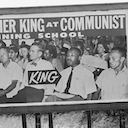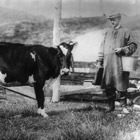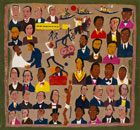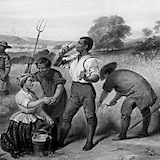
Integrity and Defiance in Equal Measure
Percival Everett’s James, set in the nineteenth century, is a novel of the present moment—when legal measures that were once regarded as essential components of racial justice are being dismantled.


Percival Everett’s James, set in the nineteenth century, is a novel of the present moment—when legal measures that were once regarded as essential components of racial justice are being dismantled.

In recent books, Adolph L. Reed Jr. and Imani Perry offer divergent explanations of Southern inequality.

Jon Henry’s photography offers the hope that remembrance can spark political change.

If colorblindness rests on the claim that the civil rights movement changed everything, the idea that racism is in our DNA borders on a fatalistic proposition that it changed little or nothing.

Wars of position that pit race against class are tired.

The rioters at the Capitol are part of an unbroken American tradition. Sweet talk about our “better angels” did not defeat them before and will not now.

Matt and Sam are joined by New York Times columnist Jamelle Bouie for a wide-ranging discussion of how conservatives (and liberals and leftists) use American history to make political claims in the present.

“We are certain that had Kościuszko been resurrected, he would himself write Black Lives Matter in big bold letters across his statue.”

By not giving the battle against racism and for equality its due, Wilfred McClay’s Land of Hope fails to explain how and for whom power was and continues to be wielded in America.

How should the struggle for reparations for slavery fit into a broader political strategy for the left?

Abolitionism is often depicted as an ineffectual campaign led by white liberals, but it was actually a radical, interracial movement—galvanized above all by the resistance of slaves themselves.

Coal embodies capitalism’s most telling paradox: that the most lucrative industries are often the most dangerous. And from the days of slavery to the present, corporations have found ways to profit from the resulting deaths.


The films about slavery that came out during the Obama years have given us more powerful and nuanced representations of slavery than we have seen before.

In Zadie Smith’s Swing Time, a young woman explores her racial identity through a love of dance—and finds a different kind of history, one that is barely written down.

An interview with Matthew Karp about his book, This Vast Southern Empire, and the international politics of American slavery.